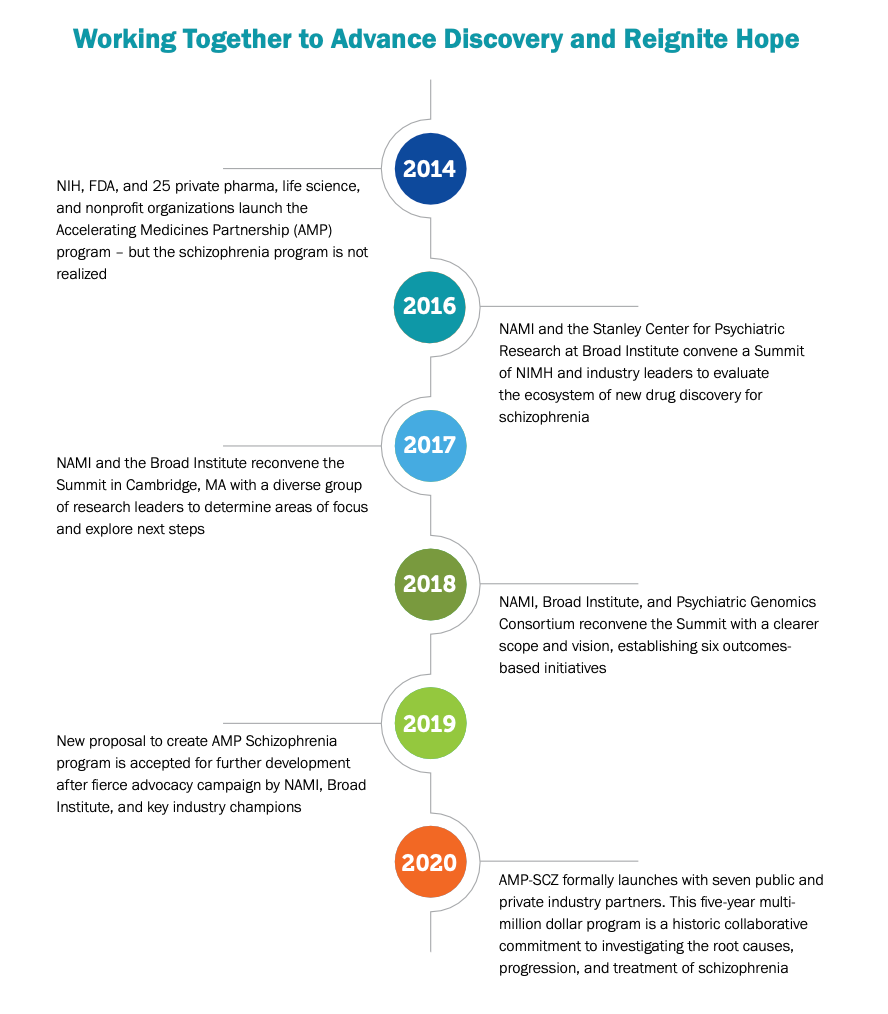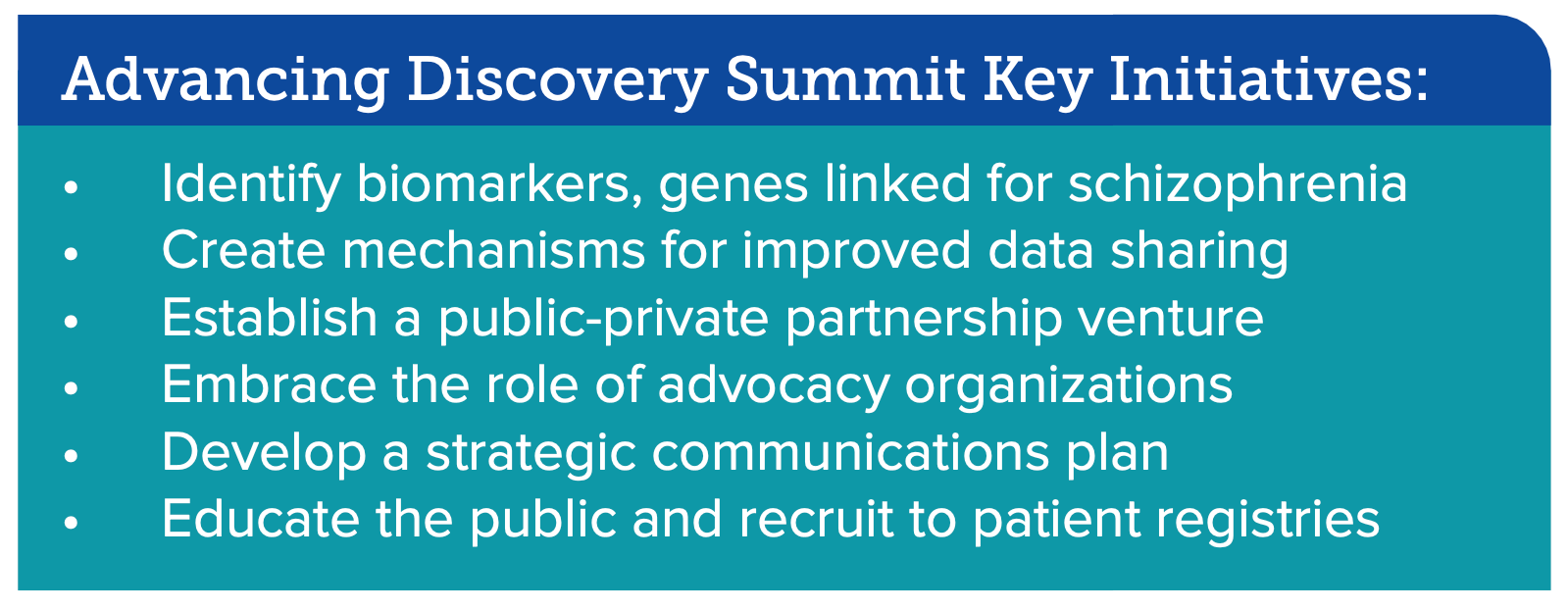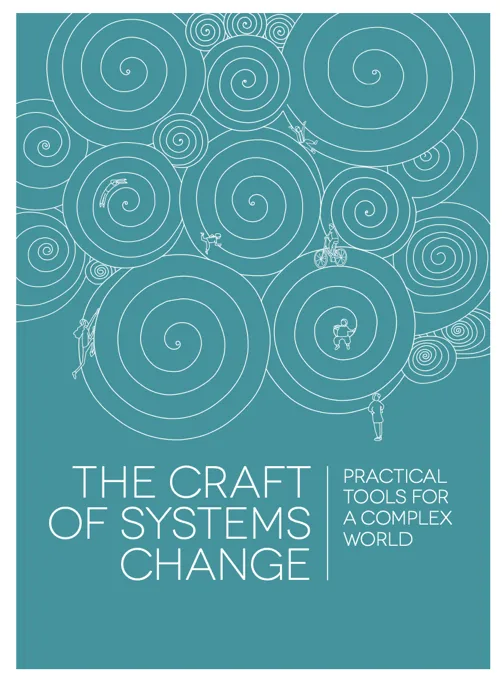The Opportunity: For many people with mental health conditions and those who care about them, the current reality of treatment options simply doesn’t live up to the excitement and hope of the initial breakthroughs of the 1950s with the dawn of psychopharmacology. Seventy years later, much of that excitement and hope remains unfulfilled. There was therefore a critical need to bring diverse stakeholders together to innovate on collaborating to advance neuroscience discovery for serious mental illnesses.
Genetics and brain science are immensely difficult even with the most leading-edge technologies, funding for research with no guaranteed return on investment is rare, and stigma against mental health conditions isolates potential allies. Every step of the process, from identifying which chemical compound has which effect on which neuronal pathway to communicating vital safety and compliance information to research volunteers, requires multiple stakeholders to commit their energy and resources to a common goal of scientific and therapeutic progress. When funding is limited, and success is not guaranteed, a unified call to action is critically important.
The Advancing Discovery Summit Series from 2016-2021 was a platform for advancing neuroscience discovery for depression and schizophrenia was a powerful first step to bring together representatives from academia, government, industry, and advocacy – breaking down barriers, sharing resources, and strategizing for common progress. Through this collaborative dialogue and brainstorming between diverse stakeholders in the scientific community, including industry, academia, patient groups, and government to develop a well-governed partnership to share research, advocacy efforts and financial risk and translate basic scientific research to strive for advances in science and technology to generate new and more effective treatment options there would be renewed hope and action to improve the lives of people impacted by serious mental health conditions.
Our Partners: Connvened over 30 thought leaders from academia, private industry, government, and private research institutions, including: National Alliance on Mental Illness (NAMI), Broad Institute, National Institutes of Health (NIH), National Institute of Mental Health (NIMH), Stanley Center for Psychiatric Research, Johnson & Johnson (J&J), Alkermes, Biogen, Genentech, Lilly, Takeda, Janssen, Otsuka, Sunovion, Boehringer Ingelheim, Sage, Lundbeck, Substance Abuse and Mental Health Services Administration (SAMHSA), One Mind, Veterans Affairs (VA) Clinical Research & Development, U.S. Food and Drug Administration (FDA), American Association of Psychiatric Pharmacists (AAPP), Brain Donor Project, Mind Strong, , University of Maryland, King’s College London, University of North Carolina (UNC)-Chapel Hill School of Medicine and Mass General.
The Journey: A multi-year process from 2016-2021, of Advancing Discovery Summit series convenings and focus groups – interviews, learning journey visits to positive deviant research efforts, like expertise from the field of Parkinson’s disease biomarker discovery, and stakeholder workshops. Designed around the organizing principal of “Diverge, Converge, and Emerge.” This process gave individuals an opportunity to move toward ideas of initial interest to them, explore those ideas with others drawn to the same topic, and finally share the results of their group- work with the larger body.
The process was initiated with the conducting of a series of in-depth dialogue interviews with leading researchers, advocates, and policymakers to evaluate the “ecosystem” of new drug discovery for schizophrenia, identifying the most glaring challenges that must be addressed to kickstart and sustain opportunities for collaboration.
A Psychiatric Genomics Consortium (PGC) was then formed with academic and industry representatives to help shape future collaboration on the newly diversified strategic goals that emerged from the scanning of the “ecosystem” as a result of the deep-dialogue interview phase.
Convenings were organized to bring over thirty thought leaders from academia, industry, government and private research institutions across the country to meet and discuss creatively a “marketplace of ideas” to address the major challenges and opportunities facing advancing neuroscience discovery for mental health conditions. This diverse group of research leaders determined core areas of focus, six outcomes- based initiatives, and explored next steps to jump-start advancements.
The Summit’s initiatives are unique in that they were established by stakeholders from many different fields, with diverse areas of expertise, who may never have found themselves on a shared project if they had not been brought together by the Advancing Discovery Summit Series.
The Result: A public- private partnership was created with the ambitious goal of eliminating barriers to the research and development of new diagnostic and therapeutic options for highly complex conditions in developing pharmacologic solutions to major mental illnesses including schizophrenia that would deliver on the promise of highly effective treatments with low risk of side effects.
Participants involved in the initiative tackled diverse topics including “keeping the vein open” during the multi-year period from initial scientific breakthrough to new drug approval, combatting stigma to engender broad public support, and structuring data-sharing agreements for cross- company and trans-national consortium studies.
Established six key outcomes-based initiatives and drafted strategic plans with measurable benchmarks in the following areas:
- Identify biomarkers, genes linked for schizophrenia and other mental illnesses
- Create mechanisms for improved access to genomic and imaging data and data sharing to limit the siloing of critical datasets
Establish a public-private partnership venture to reduce barriers in the drug development pipeline - Embrace the role of advocacy organizations
- Develop a strategic communications plan
- Educate the public and recruit to patient registries
One of the main outcomes of that work was a breakthrough public-private partnership to support collaborative research including over $100 million of new funding allocations to deepen exploration and discovery and develop new and better treatment options. The inclusion of mental health, specifically schizophrenia, as a condition of focus in the Accelerating Medicines Partnership (AMP) program – AMP-SCZ with public and private industry partners a historic collaborative commitment to investigating the root causes, progression, and treatment of schizophrenia.

















